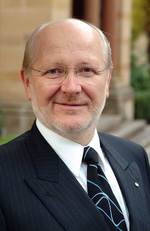From the Vice-Chancellor
It might seem like an obvious statement, but universities cannot exist in a vacuum. The advancement of knowledge in and of itself has no meaning unless it somehow relates to - or benefits - our society, and I mean that in its broadest sense, whether it be a cultural, economic, scientific, environmental, or health benefit. I do not - and have never - subscribed to the notion that universities are "ivory towers", so far removed from the community that they have lost sight of their place in society. Our University was founded because a relatively small but influential group of like-minded people realised that Adelaide needed its own centre of higher learning. They understood that in order for the community to flourish, they needed a university that would help that community to develop knowledge. The community stood to reap great benefits from that knowledge. So from the very start, the community itself was responsible for establishing our university. For more than 130 years, the University of Adelaide has played an important role in the life of the city of Adelaide, through education, research and community engagement. It has been a leader in many respects, and has responded to community needs. We were the first Australian university to admit women to academic courses - back in 1881, which is well ahead of universities such as Oxford and Cambridge. We were the first Australian university to grant degrees in Science - our first science graduate was also our first female graduate. We were the first Australian university to establish a Conservatorium of Music. Australia's first female surgeon graduated at our university, and so on... Providing opportunities for the community and responding to their needs has always been a part of what we do. And, given that our university was the only university in the State for the better part of 90 years, we have always been seen as the leader in education in South Australia. The University of Adelaide has a fine history of community engagement in the State and the nation, but we can do more - and are doing more - to engage with the community. This has now reached the point where community engagement is entrenched in our Strategic Plan, and forms one of the key pillars of our Values as an institution. Last year, we appointed our very first Director of Community Engagement, whose overarching role is to develop, maintain and enhance our relationships with community and business. We respond to community needs in terms of our education and research programs, with key industry linkages that help to ensure that there are employment and development opportunities for our students and graduates. Community service is being built into some parts of the curriculum. Our volunteering programs are bigger than ever before, tapping into a valuable part of the community, which includes people who have never set foot on a university campus before. Our fundraising committees include people who have had no past history with our university, working passionately to secure funding for facilities and scholarships because they believe in the work that we do. A great university is measured by its value to society, and I believe very strongly that we exist for the good of the community - the whole community, and not selected parts of it. We want to continue to give back to the community fine graduates and greater knowledge, to contribute to public debates, and to conduct top-class research that by all measures is valuable, useful, and impacts upon people's lives. Universities are a social necessity and an economic driver, and we want them to be wanted. The best way to do this is to place them in the middle of our community, and to make the community an important part of who we are and what we do. In the end, if we don't meet community expectations, we will - and should - cease to exist. PROFESSOR JAMES A. McWHA
Vice-Chancellor and President This has been adapted from the Vice-Chancellor's speech on community engagement to the 6th Annual Higher Education Summit, Darling Harbour, Sydney.
|





